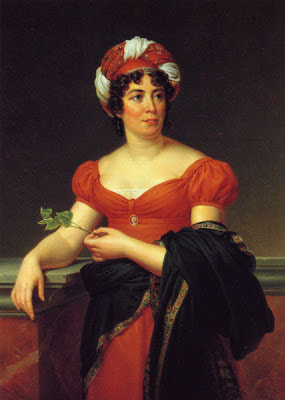|
While researching the links between Cabanis’s posthumous work, his Letter to Fauriel on First Causes, and Sophie de Grouchy’s Letters on Sympathy, I noticed how difficult it was to find any reference to Sophie. I had good reasons to look for these references. Cabanis and Grouchy collaborated during most of their adult lives. They were both members of Madame Helvetius’s salon at Auteuil, and then Cabanis helped populate Sophie’s own salon after Condorcet’s death. They met in 1786 when Grouchy married Condorcet. They were neighbours in Auteuil between 1795 and 1802, and then again near Meulan from 1807 to 1808 when Cabanis died, aged 51. They were also related – Cabanis and Grouchy's sister Charlotte were lovers from 1791 onwards and married in 1796, after the birth of their second daughter. When Sophie wrote her Letters on Sympathy, the C*** she addressed the letters to was not Condorcet, but Cabanis, with whom she shared an interest in physiology. Claude Fauriel came into the scene in 1801, first a member of Sophie’s salon (he was recommended by Madame de Stael about whose works he had just written an essay) and then Sophie’s lover. Fauriel was ten years younger than Sophie and fifteen years younger than Cabanis. Fauriel was a historian of literature, but shortly after coming into contact with Sophie and her circle, he turned to philosophy, and started working on a history of Stoicism. The manuscript for this was lost, in 1814, and nothing came of it. At the time Cabanis wrote his Letter to Fauriel, it would have been just in its beginnings. The Letter to Fauriel is about Stoicism – what they got right, what they got wrong. Cabanis is defending a vitalist thesis derived from the Stoic view that divine reason permeates the universe. And he commands the Stoic moral view that to live well is to do as much good to others as one can. But he objects to one interpretation of Stoicism which says that pain is not an evil. If it were not, then we would have no reason to want help those in pain.
The focus on pain and morality, on the role of reason in the development of sympathy for all (a moral and political cosmopolitanism) is highly reminiscent of the Letters on Sympathy published by Sophie in 1798. Fauriel’s interest no doubt prompted Cabanis’s Letter, but its contents are more of a continuation of a dialogue with Grouchy than they are with her young lover. One remark, in particular, makes the link clear. “No one knows better than you” he tells Fauriel, how important the study of religious beliefs is to history. Cabanis then goes on to describe something very like Condorcet’s Sketch of Human Progress, the philosopher’s last work, and one that had been edited, and even perhaps written in collaboration with Sophie de Grouchy. Of course none of this can be found in commentaries on Cabanis or Fauriel. Sophie de Grouchy’s very real, very substantial influence is made to disappear or is made out to be nothing more than the hosting of a salon in which brilliant men could develop their ideas. And she is not the only woman author to have been wiped out of this particular bit of the history of philosophy. Benjamin Constant is cited by several commentators (Sainte-Beuve, and Guillois in the later 19thcentury) as having been influential in a debate between Fauriel and Cabanis. However, his own partner, Germaine de Stael is not cited, even though it is was because he had been writing an essay about her work that Fauriel was introduced to Grouchy’s circle.
0 Comments
Leave a Reply. |
About
This is where I live blog about my new book project, an intellectual biography of three French Revolutionary women philosophers. Categories
All
Archives
November 2022
|



 RSS Feed
RSS Feed